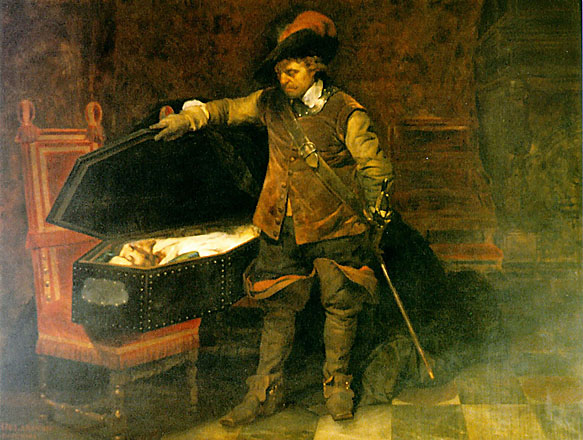Charles I and Cromwell July 28, 2012
Author: Beach Combing | in : Modern , trackback***Sorry not replying to emails annihilating headache: this is a reserve post, though heartfelt for that***
30 January 1649: the execution of Charles I. The King of England, the ‘anointed of God’ says goodbye to his younger son. He walks out into the freezing cold worried that any trembling will be misinterpreted by the crowd… His weak voice fails to carry to the onlookers as he pronounces himself a martyr. Then he ‘bow’d his comely head Down, as upon a bed’. There is the moan of the watchers as the axe crashed. The ghouls and groupies run to soak their hankies in his blood. The ripple of horror passes through Europe as an incredulous continent learns that the English have done away with their basileus.
The greatest Royalist general of all, Montrose faints on hearing the news. The young Charles II discovers his father’s death when a fellow exile called him ‘Majesty’ and cried. (‘Great! Good and Just! Had I but tears, I’d weep the world to such a strain that it would deluge once again…’) Others merely swore revenge: and their time would come…
Today killing leaders is almost routine: Ceausescu, Mussolini, Allende… But in seventeenth-century Europe no one killed kings. In this, as in so many things, the seventeenth-century English were innovators: a long hundred years before the French waded knee deep in their own bloody revolution. But around this extraordinary act of innovation there was understandable and perhaps justified fear that the English had gone too far: a people capable of breaking God’s rules so horribly, it was argued, would be capable of anything.
The brilliant nineteenth-century image here captures this sense of unease more than any other. Charles head was, in an unusual act of Commonwealth benevolence, sewn back onto his neck and the corpse was placed in Whitehall before being taken to an honoured burial. Cromwell himself, the King’s murderer, came into Whitehall to look over the body of his victim during the night: by some accounts in disguise. The great French historical painter Hippolyte Delaroche captures the wistfulness of this scene just perfectly, the destroyer of ‘the works of time’ standing above his king.
Cromwell, England’s Janus stares back into the past for the last time. In the future, meanwhile, lies the ‘democratic’ ascendancy, massacres in Ireland and Protestant cant: a world truly turned upside down.
As so often in history the good stories are probably not true… The evidence for Cromwell’s visit is fragmentary: it first appears in the eighteenth century. It would fit the man though: there is something quite Cromwellian about refusing to evade responsibility for what has been done, about the only good thing that Beach can bring himself to say about the warty one.
Beach should note that he dug this picture up to show his four-year-old daughter who continues to enjoy anecdotes from English history. When children are about two, it seems, they begin to divide the world into family units: that rock is the daddy, that rock is the mummy… Then sometime in their fourth year – at least based on Little Miss Beach’s own development – the world begins to be divided, instead, into goodies (long hairs) and baddies (no hairs). What next we wonder? By six the world will be beautiful and ugly, then by ten good-at-sports and bad-at-sports and at sixteen it will all be about who has Nike embossed on their trainers. Beachcombing is tempted to blame Cromwell and his idealists but that would almost certainly be going too far…
Beach is always scrounging for striking historical images: drbeachcombing AT yahoo DOT com
Leif, 29 Sep 2017: Dr. Beachcombing writes: ‘today killing leaders is almost routine: Ceausescu, Mussolini, Allende…’ Allende doesn’t quite belong on this list. He committed suicide [Chile inquiry confirms President Allende killed himself. bbc.com. 19 July 2011] having declined an offer of safe passage [CIA Admits Involvement in Chile. David Briscoe. abcnews.go.com].
But the list of executed heads of state is actually quite prestigious– a sort of Academy Awards for tyrants. As with the Oscars, many who genuinely deserve the honor never receive it. And a few check the list anxiously and regularly to see whether their names appear.



